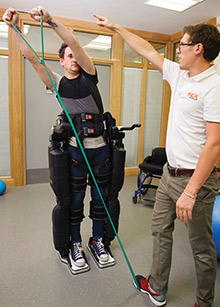 A patients performs physical therapy exercises while using the exoskeleton. Photograph courtesy of Rex Bionics.
A patients performs physical therapy exercises while using the exoskeleton. Photograph courtesy of Rex Bionics. Clinicians and engineers at the University of Kent, Canterbury, England, are conducting the first clinical trials of an exoskeleton that will allow people with paralysis to ambulate while leaving their hands free to carry out activities of daily living. The device, which uses robotic legs developed by Rex Bionics, London, England, and Auckland, New Zealand, lifts patients from a sitting position into a robot-supported standing position. The university plans to further develop the device to increase ease of use and reduce cost.
The study, carried out in partnership with the East Kent Hospitals University Foundation Trust in the School of Engineering and Digital Arts, will examine the physical and mental effect of the exoskeleton’s functionalities on the patient and the device’s reliability. The research is supported by the National Institute for Health Research, Clinical Research Network: Kent, Surrey and Sussex; it is being funded by Rex Bionics.
Editor’s note: This story has been adapted from materials provided by the University of Kent.




